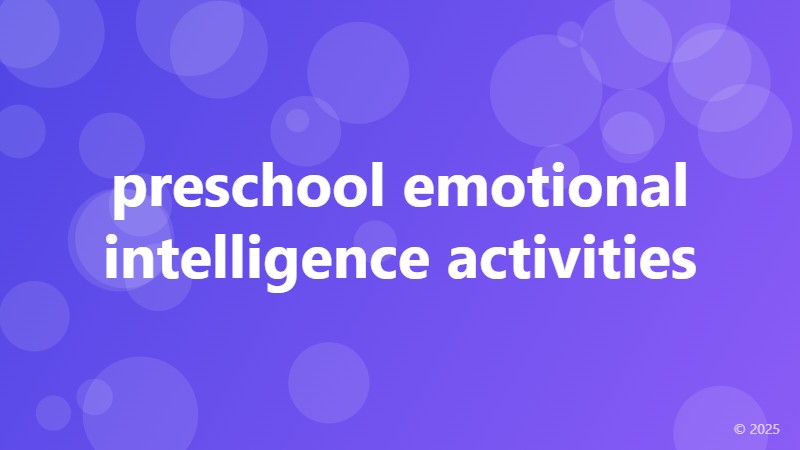preschool emotional intelligence activities

Why Preschool Emotional Intelligence Activities Matter
Emotional intelligence is the ability to recognize and understand emotions in ourselves and others. It is a vital skill that helps children develop empathy, build strong relationships, and make better decisions. In preschool, emotional intelligence activities can lay the foundation for future social and emotional success.
Research has shown that children who develop emotional intelligence at a young age are more likely to have better academic performance, better mental health, and stronger social skills. Moreover, emotional intelligence is linked to improved self-awareness, self-regulation, and motivation.
Preschool Emotional Intelligence Activities to Try
Here are some engaging and effective preschool emotional intelligence activities to try:
1. Emotion Charades
Act out different emotions like happiness, sadness, anger, and fear. Ask the children to guess the emotion and discuss how it makes them feel. This activity helps children recognize and identify emotions in themselves and others.
2. Feelings Sorting Game
Create a sorting game with different facial expressions or emotion cards. Ask the children to sort the cards into different emotion categories (e.g., happy, sad, angry). This activity helps children develop emotional awareness and vocabulary.
3. Empathy Building through Storytelling
Read stories that depict different emotions and characters. Ask the children to imagine how the characters feel and why. This activity helps children develop empathy and understanding of others' emotions.
4. Emotional Intelligence Role-Play
Use role-playing to act out different social scenarios, such as sharing toys or resolving conflicts. Ask the children to practice empathy, active listening, and effective communication. This activity helps children develop social skills and emotional regulation.
5. Self-Awareness through Drawing
Ask the children to draw a picture that represents how they feel. Then, have them explain their drawing and the emotions they depicted. This activity helps children develop self-awareness and emotional expression.
Tips for Implementing Preschool Emotional Intelligence Activities
When implementing preschool emotional intelligence activities, remember to:
Make it fun and engaging: Use games, stories, and role-playing to make emotional intelligence activities enjoyable and interactive.
Be consistent: Incorporate emotional intelligence activities into your daily routine to ensure consistent practice and reinforcement.
Use real-life examples: Use everyday situations and scenarios to teach emotional intelligence, making it more relatable and applicable to children's lives.
Encourage open communication: Create a safe and supportive environment where children feel comfortable expressing their emotions and thoughts.
By incorporating these preschool emotional intelligence activities and tips into your daily routine, you can help young children develop essential social and emotional skills that will benefit them throughout their lives.